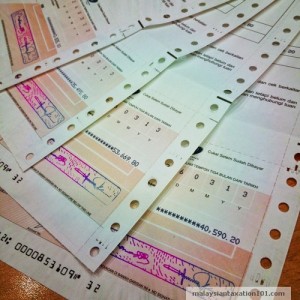
Lately, I’ve seen a lot of tax refund cheques of my clients coming in at my office. Most of the refunds were for my clients having an employment source. I’ve often wondered to myself; how will they spend their tax refund?
Undoubtedly, many, without financial discipline, will end up spending their tax refund on food, entertainment or in most guys’ case (hey, I’m speaking as a guy here), on some “big boys’ toys” (if the refund is sizeable enough).
For those of you who are expecting (or have received) a tax refund, have you thought of how to best use your tax refund? Have you thought of using it to pay off/down your debts, increase your savings, or utilising it to save you even more taxes in the coming years?
In this article, I would like to share some tips on choosing how to spend your tax refund.
Paying Off Your Debts
I don’t know about you, but for me, paying off a debt can be like lifting a huge weight off of my shoulders.
Use your tax refund to pay off your debts and target those with the highest interest rates first, or those with the smallest balances. Depending on the size of your refund and debts, you may be able to go ahead and finish off some of the smaller, but still annoying bills like credit cards. If you’re juggling payments among a few credit cards, you may be able to use the tax refund to pay off and (preferably) cancel one or two of your credit cards after that. Believe me; it always feel good to carry around less debts! Even if you’re unable to clear your credit card debts, the payment that you’ve made using your tax refund would have effectively save you up to 18% interest per annum on those debts which you’ve just settled!
Some of you may be thinking of using the refund to pay down the loans on your properties. From tax perspective, use the refund to pay down the loan on your own home first, instead of reducing the loan on the properties which you are receiving rental income from. Remember; you get a tax deduction on the loan interest which reduces your taxable rental income while from this year onwards, you don’t get a tax deduction on own home loan interest anymore.
With a debt or two removed, you will the have some breathing space in your monthly budget. If things happen, you have a bit of cash to spare if you need to use it.
Saving Money for an Emergency
Another school of thought is that, instead of fully settling your tax refund to pay off/down your debts, you should reserve some of it as some sort of financial cushion. You’ll never know; some unexpected expense such as your parents’ medical bills may crop up or as what has happened lately in Penang, an extraordinary natural mishap may cause damage to your home/rental properties. The tax fund (in part or in full) will come in handy then.
If you don’t have such reserve funds yet, then take your tax refund and invest it a moderate return yet liquid savings instrument such as money market funds where you can get to it if need and it can grow when you don’t.
Save Taxes for the Coming Years!
For the financially disciplined and debt-free, most people would usually think of investing their tax refund in some conventional instrument/products that will give them the highest returns possible. Here, can I interest you in a product that can potentially give you a first-year return of up to 26% (or even slightly more) on your investments? Now that I have your attention, I’m talking about nothing more than your PERSONAL RELIEFS for tax purposes. If you weren’t aware and haven’t taken advantage of them yet, there were a couple of new tax reliefs for individuals over the past couple of years that could potentially save you up to RM1,560 in taxes ANNUALLY! The personal reliefs that I’m referring to are:
- Premiums paid to the approved deferred annuity/Private Retirement Scheme of RM3,000 per annum; and
- Increase in deposit for child into the Skim Simpanan Pendidikan Nasional account established under Perbadanan Tabung Pendidkan iTinggi Nasional Act 1997 from RM3,000 to RM6,000 per annum.
Besides the product benefits, by putting your tax refund in the products mentioned above, you may potentially save yourself up to 26% (depending on your personal tax rates) in taxes a year!
You can learn more about the above personal reliefs from my earlier articles:
- Maximising of Tax Savings
- Personal Relief: Private Retirement Scheme or Deferred Annuity?
- Contribute to the Private Retirement Scheme to Reduce Your Tax Bill
Spread a Little Happiness – Give to Others!
If you feel that you already have your financial bases covered, then perhaps you can use your refund to make a charitable contribution to help others less fortunate or a cause you believe in. Besides feeling good about helping others, you’ll be rewarded for your good deed when you file your tax return next year as you will get a tax deduction on the donations you make to approved organisations/causes.
That’s the major points I can think of on how to use your tax refund and I’m sure you have some thoughts of your own. I’d like to hear from you about your money plans for your tax refund. How do you plan to spend your tax refund? I’m sure other readers would like to know too 

